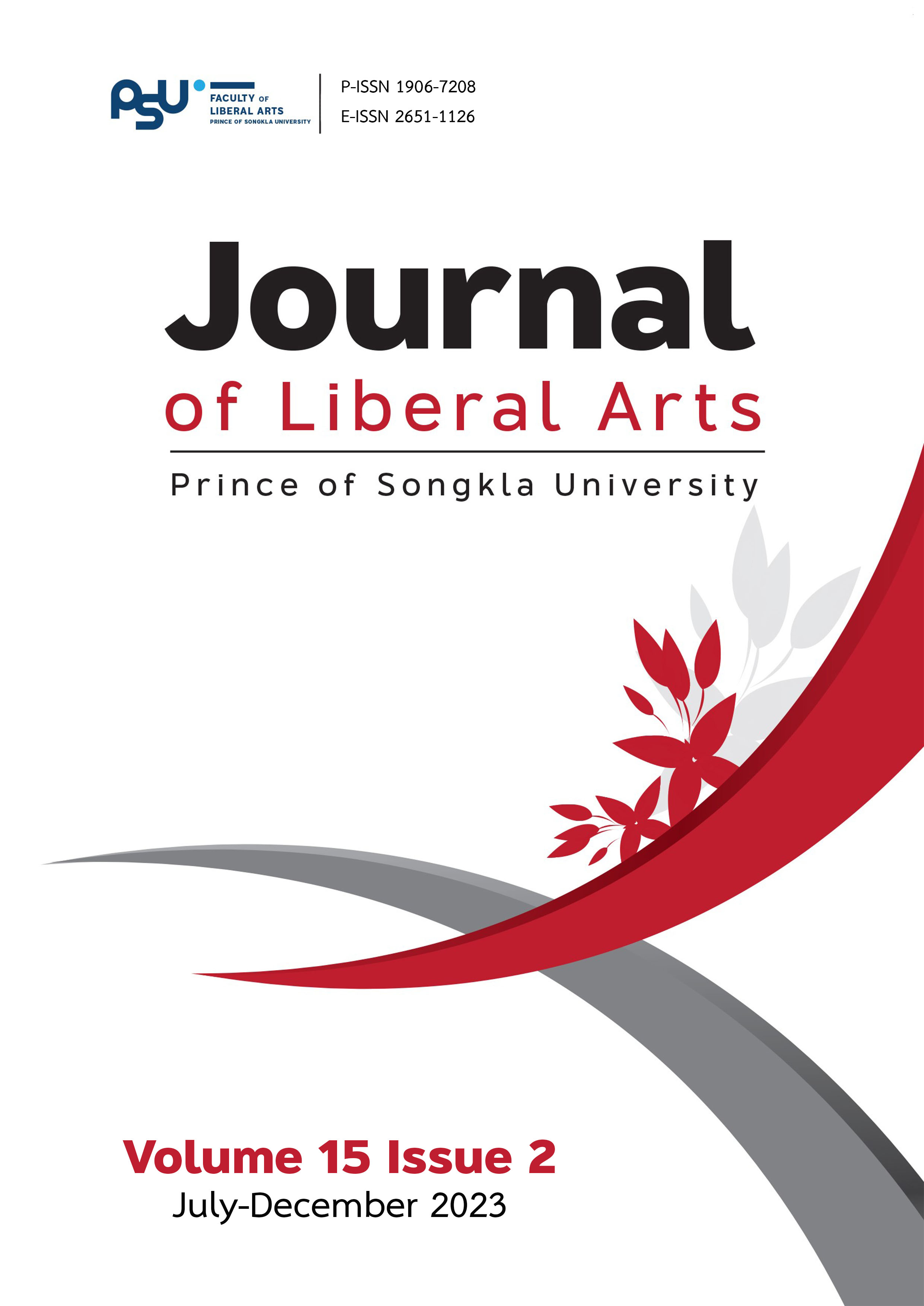English Communication Problems and Solutions of Thai Hotel Staff Working with Foreigners in Phuket Province
DOI:
https://doi.org/10.14456/jlapsu.2023.19Keywords:
English communication problems, English in the workplace, hotel staffAbstract
The hotel industry is one of the prime sectors in the tourism and hospitality industries where English is used as a medium for communication. Although hotel staff are required to use English when serving foreigners, communication problems frequently occur. As a result, this study aimed to analyze English communication problems, with a focus on speaking and listening skills, and to investigate solutions for hotel staff who communicate with foreigners. The samples in this study consisted of ninety-five hotel staff in Phuket. Questionnaires and interviews were used to gather data. The collected data were analyzed using percentages, means, standard deviations, and content analysis of interview data. The findings revealed that the overall problem in English listening among the sample group with foreign customers and foreign staff was low (x̅= 1.55, S.D. = 0.77), (x̅= 1.52, S.D. = 0.74), with the most common problem being listening to various English accents. Furthermore, while English speaking problems with foreign customers and foreign staff were the lowest (x̅= 1.39, S.D. = 0.73), (x̅= 1.38, S.D. = 0.71), telephone communication in English were the most common. The most common way to solve English communication problems with both foreign customers and staff was to apologize and ask for repetition (x̅= 4.63, S.D. = 0.62). The findings of this study could be used as guidelines to improve English communication among relevant staff or those interested in working in the hotel industry.
References
Arunchai, K. (2020). A study of English language usage problems of front office staff: A case study of a hotel in Sutthisan District, Bangkok province [Master's thesis, Bangkok University]. http://dspace.bu.ac.th/jspui/handle/123456789/4560
Boonyaruksa, S. (2021). English code-mixing characteristics in working of hotel personnel in Nonthaburi province. University of the Thai Chamber of Commerce Journal,41(4), 148-167.
Chaichana, M., Cheawchan, S. & Thongnen, S. (2017, August). English communication problems of receptionists at hotels in Nan in foreign tourists’ perspective [Paper presentation]. The 9th Rajamangala University of Technology National Conference: Creative RMUT and Sustainable Innovation for Thailand 4.0, Bangkok, Thailand. http://repository.rmutr.ac.th/123456789/681
Charoensuk, S., & Tantihachai, K. (2021). English communication strategies used by undergraduate students at Rajamangala University of Technology Srivijaya during practical training. Journal of Education Prince of Songkhla University Pattani Campus, 32(3), 86-102.
Charoensuk, S., Chuay-in, P., & Watecho, T. (2018). Problems and the need for English usage of tour salespeople in Trang province. Academic Journal Thonburi University, 12(28), 256-259.
Chombuathong, S. (2019). Solving English communication problems by emphasizing problems in the digital economy era. Journal of MCU Social Development (JMSD), 4(1), 86-100.
Davidoff, M. (1994). Contact customer service in the hospitality and tourism industry. Prentice Hall Career and Technology.
Hotekim, S., & Taylor, P. (2020). Problems in speaking English during meetings organization: A case study of English as a foreign language user in a social media company. Academic Journal Phranakhon Rajabhat University, 4(2),12-26.
Hutchinson, T., & Waters, A. (1987). English for specific purposes: A learning centre approach. Cambridge University Press.
Internet World Stats. (2021, July 3). Internet world users by language top 10 languages. https://www.internetworldstats.com/stats7.htm
Intorn, C., Charoenarpornwattana, P., & Chuchuen, R. (2020). Problems and needs for the development of English communication skills of bank staff in Pattaya city. Pathumthani University Academic Journal, 12(2), 266-276.
Jindapol, P. (2023). Guidelines for developing English
communication skills of front office staff in 3-star hotels in Phang Nga province. Suan Sunandha Academic and Research Journal, 15(1), 28-48. https://doi.org/10.53848/ssajournal.v15i1.252295
Kamwiset, B. (2018). English language readiness of front office staff in hotels and accommodations in Phuket province. Journal of Humanities and Social Sciences, Rajapruk University, 3(3), 25-35.
Kanjanasilanon, C. (2016). Creating customer value and satisfaction in hotel business. Veridian E-Journal, Silpakorn University, 9(2), 154-168.
Lincharoen, U. (2011). Qualitative data analysis techniques. Journal of Educational Measurement, 17(1), 17-29.
Ministry of Tourism and Sports. (2023, January 24). International tourist statistics arriving in Thailand in 2023. https://mots.go.th/more_news_new.php?cid=632
Prachachart Business. (2023, March 23). Phuket sandbox generated revenue exceeding 50 billion baht. https://www.prachachat.net/local-economy/news-893326
Prasitratsin, S. (1997). Social science research methods. Liang Chiang.
Rattanapiboonwong, M. (2023). Survey of English language usage needs for operational level employees in international companies [Master's thesis, University of Phayao]. University of Phayao Digital Collections. http://www.updc.clm.up.ac.th/handle/123456789/539
Robinson, P. (1991). ESP today: A practitioner’s guide. Prentice Hall International.
Scott, B. (1996). The skills of communicating. Cambridge University Press.
Sonthimoon, M., & Khamdet, I. (2014). Satisfaction of foreign tourists towards services of 5-star hotels in Bangkok. Journal of Finance, Investment, Marketing, and Business Management, 4(2), 204-217. http://thaijournal.com/journal/2557volumes2/11.pdf
Srisakorn, S. (2004). The development of problem-solving abilities of Mathayomsuksa 2 students who manage learning by using problem-solving techniques. [Master's thesis, Silpakorn University]. Silpakorn University Digital Collections.
Thongsai, P., & Sittipragan, K. (2021). English communication problems for local tourism business in Khanom district, Nakhon Si Thammarat province. Ratchapruek Journal, 17(3), 129-136.
Tourism and Sports Economic Bureau. (2022). Tourism situation in August 2022. https://www.mots.go.th/download/article/article_20210929113313.pdf.
Watthanarangsan, P., & Sutanyarak, C. (2019). Enhancing performance of 4-star hotel employees in Siam Square. Journal of Humanities and Social Sciences Valaya Alongkorn, 11(1), 71-80. http://dspace.bu.ac.th/jspui/handle123456789/1654
Yamane, T. (1967). Statistics: An introductory analysis (2nd ed.). Harper & Row.
Downloads
Published
How to Cite
Issue
Section
License
Copyright (c) 2023 Yoschanin Pinsirikul,Wanwimon Chuduang,Tipkamon Nunainam,Ladawan Jantawong,Varidta Tapnimit

This work is licensed under a Creative Commons Attribution-NonCommercial-NoDerivatives 4.0 International License.
The authors retain the copyright to their article but the Journal of Liberal Arts, Prince of Songkla University reserves the exclusive rights to first publication.






